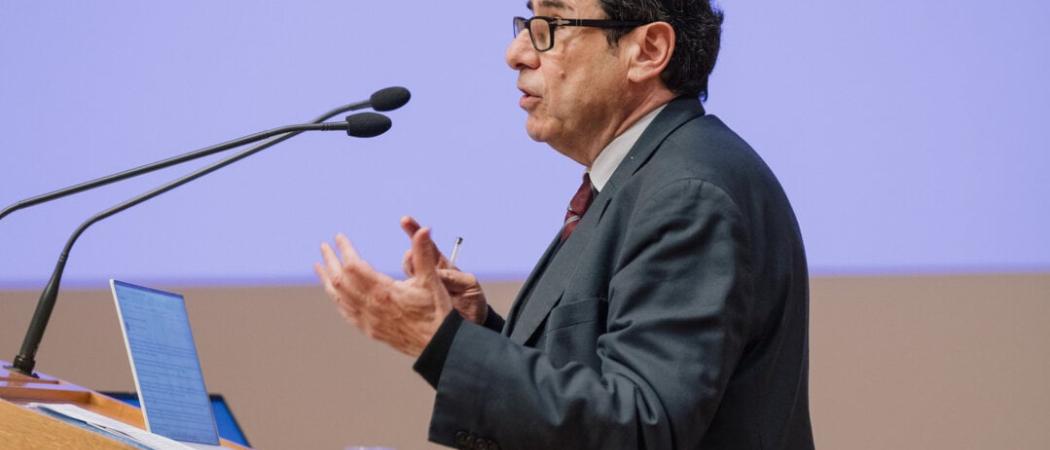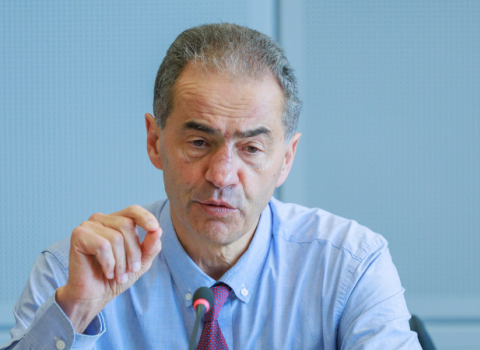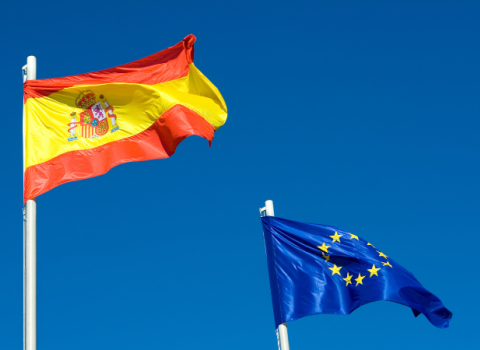Philippe Aghion’s ideas on creative destruction play into the debate on whether the EU should prop up its industrial champions

Philippe Aghion speaking at Collège de France. Photo credits: Patrick Imbert / Collège de France
The EU should establish a European Research Council (ERC) equivalent to give long-term support to research labs, one of the winners of this year’s Nobel Prize for economics has argued.
French economist Philippe Aghion was awarded the prize on October 13 for his work that argues economic growth relies on “creative destruction”, with new more innovative firms pushing out old ones.
In a press conference following the award, Aghion said that Europe lacked the institutions and policies needed for high-tech, breakthrough innovations, and this had led the Eurozone to fall behind the US in per capita GDP since the 1980s.
“We remained circumscribed to mid-tech, incremental [innovation],” he said.
Europe has “fantastic breakthrough research”, said Aghion, who holds positions at the Collège de France, INSEAD and the London School of Economics and Political Science.
He commended the progress done so far by the ERC in funding bottom-up scientific discoveries. “But we should also have an ERC for labs, to finance laboratories on a long-term basis,” he added.
Aghion and fellow economists argued for this measure in a policy paper released in August, saying it would give stable support to “research teams organised around priority topics rather than individual careers.”
He also warned that Europe lacks an equivalent of the Defene Advanced Research Projects Agency (DARPA) in the US, which has been involved in world-changing inventions such as ARPANET, the precursor to the modern internet.
This kind of innovation agency is a “pro-competition way of doing industrial policy,” he said.
“European countries have to realise that we should no longer let US and China become technological leaders and lose to them,” he said.
Influential ideas
Aghion’s Nobel win is important because he is one of the intellectual driving forces behind last year’s report by former Italian prime minister Mario Draghi, whose recommendations are now feeding through into EU research and innovation policy.
Draghi also recommended the EU establish a DARPA-like body, and warns that the EU’s Horizon Europe research and innovation programme does not support enough “breakthrough innovation.”
The European Innovation Council, which funds new technology ideas and gives scale up funding to start-ups, now says it wants to become more like DARPA. In recent years, Germany and the UK have set up their own innovation agencies, in part modelled on DARPA.
Aghion’s warning about Europe’s “mid-tech” predicament also echoes that of other economists, who last year argued that too much European private R&D was concentrated in the automotive sector, which was only making incremental technological improvements and risked being leapfrogged by US and Chinese rivals.
Claiming credit
EU research funding bodies have rushed to claim credit for supporting Aghion’s work.
The ERC, which has awarded Aghion €4.41 million in funding, celebrated his win. “We’re thrilled that Philippe Aghion is amongst the winners,” said ERC president Maria Leptin in a statement.
However, Aghion’s ERC Advanced Grants, reserved for already established scientists, were given to him in 2018, 26 years after a seminal paper first introducing his Nobel-winning ideas.
Still, Aghion was supported much earlier in his career by EU funded scientific training networks, now known as Marie Skłodowska-Curie Actions. He was a scientific coordinator and a researcher in two networks in the early 2000s, and was then later involved in a further network that explored economic modelling for climate policy in the mid-2010s.
Related stories
- Viewpoint: we need to invest in ‘pro-worker’ artificial intelligence research, not automation
- EU Framework Programmes have ‘little impact’ on growing companies
- EIC programme managers have to handle up to 300 projects each
Creative destruction
Aghion’s prize yesterday, along with awards for the US economists Joel Mokyr and Peter Howitt, is a broader recognition for the idea that the economy needs “creative destruction” – the ousting of old firms by new ones with better ideas and technologies.
“In different ways, the laureates show how creative destruction creates conflicts that must be managed in a constructive manner,” the Royal Swedish Academy of Sciences said in its announcement. “Otherwise, innovation will be blocked by established companies and interest groups that risk being put at a disadvantage.”
Agnion’s seminal paper, authored in 1992 with Howitt, laid out a mathematic model of how companies that invest in new products and processes outcompete incumbents.
His win was seized upon by Commission president Ursula von der Leyen, who said Aghion’s work was a “strong reminder that innovation and openness are the foundations of our shared prosperity”.
Prop up incumbents?
However, Europe also wants to save its existing industrial champions, such as German car and chemicals giants, from US and Chinese competition, and so faces a dilemma over whether to prop them up or funnel resources instead to newer firms.
Airbus, the Franco-German giant that now arguably leads global aerospace, is seen as one example of Europe having successfully saved existing industries by combining firms and giving them the scale to compete.
However, the Framework Programmes have been criticised for dishing out too much money to big incumbent companies such as Airbus, despite these companies failing to produce radical new innovations. Airbus spends too little of its R&D budget on next generation electric or hydrogen planes, others have warned.
Majority benefit?
Yesterday’s economics prizes paint a picture of history in which openness to change, the integration of theoretical and practical knowledge, and a fierce churn of companies lead to constant economic growth.
But in the Academy’s description of their work, there’s less focus on whether this economic growth actually leads to rising incomes and living standards for ordinary people.
Last year’s economics prizes, by contrast, included awards for two economists who argue that technological progress does not automatically benefit the majority, unless people gain political power, though unionisation or enfranchisement, to take a share of the proceeds.
In Power and Progress, Massachusetts Institute of Technology economists Daron Acemoglu and Simon Johnson point to the European Middle Ages, where increased productivity from inventions like windmills and crop rotation benefitted not peasants but the Church, whose power as a landowner allowed it to extract the surplus.
The industrial revolution failed to increase living standards, until inventions came along that augmented, rather than automated, workers.
The commonplace, optimistic view of progress – that technological change automatically benefits the majority, despite a few bumps in the road – was endemic in policymaking, but is not borne out by history, Johnson told Science|Business in an interview last year.
However, despite his focus on creative destruction, Aghion isn’t by any means a sink-or-swim libertarian.
“Prosperity and happiness” is a combination of both technology and institutions, Aghion said during his press conference yesterday. He also praised Europe’s concern for social equity, and the Danish welfare model.





 A unique international forum for public research organisations and companies to connect their external engagement with strategic interests around their R&D system.
A unique international forum for public research organisations and companies to connect their external engagement with strategic interests around their R&D system.